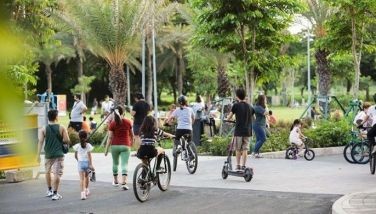Asia’s new roadblock to prosperity
As world leaders assemble for the Asia-Pacific Economic Cooperation(APEC) meetings on 18–19 November in Manila, the region’s socio-economic prospects will be a top concern. Strong economic growth over the past quarter century cut poverty sharply in the region. But this came at the price of environmental destruction and rising income inequality. Inherent in these twin problems is global warming, which world leadership, meeting for climate talks in Paris next month, is urged to confront.
In this setting, just continuing the past policies that delivered economic success will not work. To understand why, we need to recognize that climate change is a game changer. At current rates of greenhouse gas production, CO2 concentrations will reach the critical level of 450 parts per million in a quarter century. Above this threshold, temperatures will rise above 2°C from preindustrial levels, leading to catastrophic impacts. Asia-Pacific will be among the hardest hit.
To dodge this scenario, energy-related emissions alone need to fall by 40–70% below 2010 levels worldwide by 2050. In addition to a meaningful global accord in Paris, unilateral actions are called for, such as the Obama administration’s decision to reduce carbon emissions from power plants by 32 percent below 2005 levels by 2030.
Asia-Pacific has borne the brunt of a marked rise in floods, storms, and droughts. The 10 hottest years on record occurred after 1997 and 2015 could well surpass 2014 as the hottest year on record. Intense floods have risen fourfold and storms two and a half times over the past four decades, a finding that comes as no surprise to Filipinos living in the typhoon path.
To mitigate the surge in climate-related disasters, all countries need to act. Industrial countries were the primary source of carbon build-up; developing Asia is now the source of some 37% of global emissions. With energy accounting for two-thirds of emissions today, the required shift from reliance on fossil fuels will be huge. Electricity generation is a challenge worldwide, with two-third to four-fifth relying on fossil fuels in China, Japan, US and Russia.
Renewable energy sources – solar, wind, wave, tidal, geothermal and biomass – need to expand, and battery storage, smart grids and demand measures improved. Fossil fuel subsidies have to be slashed, as India and Indonesia have started to do. A tax that sets a price on carbon could reduce the demand for dirty fossil fuels, and increase the demand for renewable sources. China plans a cap and trade scheme in 2017, which could make the country the world’s biggest carbon market.
Dealing with city pollution and congestion benefits climate adaptation and mitigation. Abatement is urgent for the unacceptable air pollution levels in Delhi or Beijing. Urban congestion in Manila or Bangkok needs addressing, including with intelligent transport systems as in Seoul. Municipal waste requires conversion of waste to energy, anaerobic digestion, recycling and reduced waste disposal. We need to strengthen roads and embankments, build in safer areas, and invest in rain harvesting, drainage, and early warning systems. Financing can be tapped: for example the Green Climate Fund just approved a $31 million climate adaptation grant for an urban project in Fiji supported by the Manila-based Asian Development Bank.
Climate impacts are linked to environmental degradation. In Indonesia, haze from slash-and- burn agriculture to clear areas for palm oil spread throughSoutheast Asia, at a tremendous cost to human health, precious biodiversity and economic activities. On the worst days, fires emitted more carbon than the entire US economy. Neglect of environmental regulation is causing industrial losses too. The 2015 explosion in the warehouses in Tianjin, China caused 173 deaths while the 2012 fire in a fashion factory in Dhaka, Bangladesh took at least 117 lives. In the industrial world, Volkswagen’s cheating on automobile emissions is a colossal scandal.
Dealing with climate change and caring for the environment will be essential for attaining more inclusive growth; greater inclusion and climate action reinforce each other. Rising economic inequality and climate risks jointly threaten to roll back years of hard-won gains in poverty reduction. In India, the Philippines, Thailand and others, inequality is aggravated by climate change and its impacts on hazards of nature.
Climate change has increased the region’s susceptibility to food insecurity, health and safety concerns, loss of employment and tourism, disruption of education, and damage to infrastructure. Climate-related disasters hurt the poor more because they are more likely to locate in harm’s way and especially vulnerable to shocks. Effective safety nets such as conditional cash transfers in the Philippines (or Brazil and Mexico) can help.
Economic forecasting has yet to make this link, but this year’s APEC summit must seize the opportunity to press the message that only with a swift response to climate change, coupled with support for inclusive and environmentally sustainable growth, can Asia and the Pacific maintain its economic performance.
* * *
Vinod Thomas is the Director-General, Independent Evaluation, Asian Development Bank.
- Latest
















